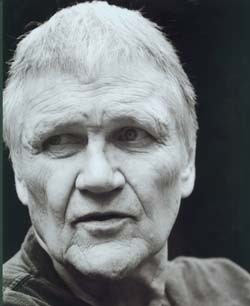Harry Crews
Writer

1935 - 2012
Inducted in 2009
Biography
A brilliant novelist and satirist in the Southern Gothic tradition, Harry Crews has put his name to 17 novels, two major collections, numerous short stories, essays and film screenplays. Crews also is credited as a gifted instructor and mentor for younger writers. Rising from very difficult rural circumstances in his youth, he taught for 30 years at the University of Florida in Gainesville, his alma mater. His writing illuminated the cultures of Florida's common folk, giving voice to their lives
Harry Eugene Crews was born in 1935 in Bacon County, Georgia, near Waycross, into a hardscrabble farming family. Crews's father died when he was 21 months old. His mother Myrtice soon remarried, but not well. Crews and an older brother grew up not only amid poverty but also with a violently abusive, alcoholic stepfather. Myrtice eventually fled with her family to Jacksonville, Florida, where Crews spent his adolescence.
As a way of escaping his family's strife and seeing the world he'd read about in books, in 1952 Crews, at 17, joined the U.S. Marines and served in the Korean War. It was during his three-year military service that Crews began reading in earnest. He left the service determined to learn to write, and with the G.I. Bill he suddenly had a way to realize his dreams. At 22, he enrolled at the University of Florida.
But after only two years, Crews found himself itching for a change. He dropped out of school for an 18-month road trip on his Triumph motorcycle. He traveled the U.S., working at odd jobs and soaking up a variety of cultural experiences from the Deep South to the Northwest. In 1958, he returned to Gainesville and graduated in 1960. Early that year he also married Sally Ellis, a sophomore he'd met in his early days on campus. That fall, Sally gave birth to Patrick, the first of two sons.
After a year of teaching English in a Jacksonville junior high school, Crews returned to Gainesville for graduate school. While concentrating on his studies, Crews—by his own admission years later—neglected his family obligations. The couple divorced and Sally moved with their son out of Florida.
Upon graduating, Crews was turned down in his application for further studies in the university's creative writing program. He soon settled in Ft. Lauderdale, working as an English teacher at Broward Community College. He persuaded Sally to rejoin him and remarry, and in 1963 son Byron was born.
But the following year, tragedy struck when Patrick, age 4, drowned in a neighbor's swimming pool. The pain and anguish from losing his son eventually cost Crews his family once again. After his second divorce from Sally, Crews never remarried.
In 1968, Crews published his first novel, The Gospel Singer, and to good reviews. Crews was invited to join the English faculty of his alma mater that year, where he became famous long before retiring in 1997. A prolific writer, Crews published eight novels and an autobiography during his first decade at UF. The profusion of work established Crews as a fixture in the so-called Southern Gothic literary tradition made popular by such acclaimed Southern writers as William Faulkner, Truman Capote, Tennessee Williams and Flannery O'Connor. The tradition is marked by characters who are physically or mentally damaged in some way, in settings that can include the supernatural.
Crews also excelled in creative non-fiction work. His Florida Frenzy (1982) is a collection that includes many of his best non-fiction pieces and is generally regarded as being the quintessential book for fans. By the early 1990s, Crews's fan base had spread to Europe where publishers' translations of his works into French and Italian complemented his popularity in Britain.
Before he retired from UF in 1997, Crews was the subject of a documentary film by Gary Hawkins entitled The Rough South of Harry Crews. The film won a regional Emmy Award and the Corporation for Public Broadcasting's Gold Award for 1992. Since then, Crews has been featured in two other documentaries. In 2004, he had a cameo role in Searching for the Wrong-Eyed Jesus, a look at fundamental religion in the rural South. In 2007, Harry Crews – Survival is Triumph Enough was released by United Pictures International.
Crews is the recipient of many prestigious awards, including that of The National Institute of Arts and Letters. Termed a literary lion by national media, the artist has carved out a major place for himself in the literary communities of Florida, the nation and the world.

